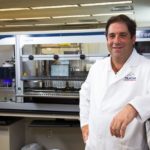
The U.S. Food and Drug Administration on Friday authorized the first diagnostic test with the option of using home-collected saliva samples for COVID-19 testing
Specifically, the FDA issued an emergency use authorization (EUA) to Rutgers Clinical Genomics Laboratory for their COVID-19 laboratory developed test (LDT). The EUA for Rutgers Clinical Genomics Laboratory’s molecular test permits testing of a saliva sample collected from the patient using a designated self-collection kit. Once patients collect their saliva sample, they return it to the Rutgers Clinical Genomics Laboratory in a sealed package for testing.
The Rutgers Clinical Genomics Laboratory test is currently the only authorized COVID-19 diagnostic test that uses saliva samples to test for SARS-CoV-2, the strain of coronavirus that causes COVID-19. The test is by prescription only.
Rutgers University says the new saliva collection method, which Rutgers developed in partnership with Spectrum Solutions and Accurate Diagnostic Labs (ADL), will allow for broader population screening than the current method of nose and throat swabs.
“The impact of this approval is significant,” said Andrew Brooks, chief operating officer and director of technology development at RUCDR, who also is a professor in the School of Arts and Sciences Department of Genetics at Rutgers University–New Brunswick. “It means we no longer have to put health care professionals at risk for infection by performing nasopharyngeal or oropharyngeal collections. We can preserve precious personal protective equipment for use in patient care instead of testing. We can significantly increase the number of people tested each and every day as self-collection of saliva is more quick and scalable than swab collections. All of this combined will have a tremendous impact on testing in New Jersey and across the United States.”
For the FDA press release, click here.
For the Rutgers University press release, click here.
Photo is Rutgers Professor Andrew Brooks, chief operating officer and director of technology development at RUCDR Infinite Biologics. Photo: Rutgers University